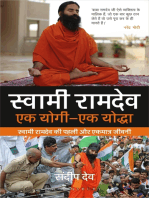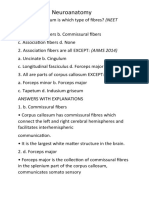Sivavakkiyar 2012 5
Sivavakkiyar 2012 5
Uploaded by
MuraliCopyright:
Available Formats
Sivavakkiyar 2012 5
Sivavakkiyar 2012 5
Uploaded by
MuraliOriginal Title
Copyright
Available Formats
Share this document
Did you find this document useful?
Is this content inappropriate?
Copyright:
Available Formats
Sivavakkiyar 2012 5
Sivavakkiyar 2012 5
Uploaded by
MuraliCopyright:
Available Formats
Classic Poetry Series
Sivavakkiyar
- poems -
Publication Date:
2012
Publisher:
PoemHunter.Com - The World's Poetry Archive
www.PoemHunter.com - The World's Poetry Archive 2
Sivavakkiyar (10th Century AD)
Sri Sivavakkiyar (sometimes Civavakkiyar) was a great Tamil Poet who lived
in the period preceding the 10th Century A.D.
Sivavakkiyar was an early rebel against the Brahmanic order, he was
resolutely opposed to the Caste system and was opposed to idol worship and
temple ceremonies. His rebellion against any kind of orthodoxy meant his
work was left out of the Saiva canonical literature however some of his
poetry is well read in Tamil literary compendiums.
Sri Sivavakiyar, was born with Lord Shiva's name on his lips. He said that the
constant repetition of the Lords name would even turn ones body into gold. A
great rennuciate he is said to have lived for over 4,000 years. His works
include Naadi Parikshai and Sivavakiyar 1000.
He came to Kasi after learning vedas. There he met a Siddhar/Seer/Saint,
who was also a cobbler. Though the Saint/Siddhar could sense the power of
Sivavakiyar, he wanted to test him. So he gave Sivavakiyar some money and
asked him to give it to his sister, 'River' Ganga. He also gave him a bitter
Bottle Gourd and asked him to remove the bitterness from the Bottle Gourd.
Sivavakiyar immeditely left for the river bank without any second thoughts
on whether the tasks can be completed or not. After he reached the banks, a
beautiful hand raised above the water and Sivavakiyar without any second
thoughts placed the money on the hand. The hand returned back into the
water. He also washed away the bitterness from the bottle gourd and took it
back to the Siddhar. The Siddhar was happy to see that Sivavakiyar had
passed the test. He wanted to test him once more. So he gave Sivavakiyar a
waterbag and instructed Sivavakiyar to call out for Ganga and ask for the
money that he had given her earlier. Sivavakiyar at once called out to Ganga
asking for the money. Immediately a beautiful hand appeared from the
waterbag and gave him back the money. Sivavakiyar, without being
perturbed even for a single moment, took the money and gave it to the
Siddhar. The Siddhar was realy impressed on Sivavakiyar's ability to focus
without being bothered by doubts or anxiety. Then he asks Sivavakiyar to
lead a family life till he attains samadhi. He also gives him some sand and a
bottle gourd and says that the lady who cooks both the sand and the bottle
gourd would be his wife.
After taking leave from the Siddhar, Sivavakiyar continues his pilgrimage. In
the midst of his travel, he meets a Nari Kurava (Gypsy) group and they
welcome him wholeheartedly. After talking to them for some time, a lady
from Nari Kurava gang rushes upto him and says that she will be happy to
serve him and that he should not hesitate to ask for her help. Sivavakiyar
immediately gives her both the sand and bottle gourd and asks if she could
www.PoemHunter.com - The World's Poetry Archive 3
cook both sand and bottle gourd together. The lady without hesitating a
moment, takes both and rushes to the kitchen. After some time she comes
back with cooked rice (the sand has turned into rice) and bottle gourd curry.
Sivavakiyar immeditely realizes that he has met his wife and asks the group
if he could marry her. They also agree to the proposal on the condition that
he also stays and travels with them. He also agrees and marries his lady. But
he also makes sure that he does continues with his spiritual practises.
Siddhar Sivavakiyar continued to stay with the Gypsy group and also
diligently learnt their work. Once he went to the forest to get firewood. He
chose a tree and started to cut. Suddenly Gold Dust started sprinkling from
the tree. After seeing this he started to run shouting that "Lord Yama" (Angel
of Death) has arrived. His group asked him what happened and he told them
what he saw. Hearing this some 4 people left for the forest with gunny bags
to collect Gold Dust. By the time they had filled their bags it started to
darken. Since they were hungry, it was decided that two of them would go to
the nearest village to get food. Those who went to the village planned to kill
their partners who had stayed behind, so they added poison to the food. And
the two persons who had stayed behind also plotted against the other two
partners who had gone to get food. On their way back to the forest, the two
persons who had gone to collect the food were done to death by the other
two persons. After killing their partners, they sat down to have their food and
in no time they also passed away. Next day Sivavakiyar saw the four bodies
and felt sorry that these four people had lost their lives to "Lord Yama" (i.e.
the Tree).
Sivavakiyar had a friend with the name Konganar, who was also a great
Siddha. Konganar felt very bad that his friend, who is a Master Siddha, was
living a life of poverty. So one day, he went Sivavakiyar's home, knowing
that Sivavakiyar would not be available. He asked Sivavakiyar's wife to get
some Iron and turned the same to Gold and left after handing over the Gold
to her. Sivavakiyar's wife narrates the incident to him after his return.
Sivavakiyar asks his wife on whether she wants the Gold. His wife replies
that his love is all that she wants and not the gold. Then he asks his wife to
drop the gold in the well and his wife also obliged wholeheartedly.
One day few devotees of Siva came to Sivavakiyar and asked whether he
would teach them to make Gold, so that they could eradicate poverty and
this also will help in removing negative Karma. Hearing this Sivavakiyar
laughed and asked why Gold is required for removing negative Karma. He
also advised them to leave behind all materialistic desires and merge their
consciouness with Lord Siva. And added that this is the only way to attain
Nirvana.
It is believed that he was an Atheist who later converted to Saivism and then
to Veera Vaishnavaism. He attained Siddhi at kumbakonam. Even now pujas
are regularly conducted escpecially on Full Moon Day. Those who pray to him
are blessed with clear mind without any anxieties or worries about the past
or future. One can pray to Sivavakiyar on Mondays, wearing white clothes
and with white flowers. This is told as a remedy for those people with
Chandra Dhosham.
He was generally considered to be an iconoclast because he vehemently
decried temple worship. He did so no doubt, but he said still more
vehemently that man should make his heart the temple of God. He had scant
respect for rituals which in popular belief had become a substitute for love
and service to God and to fellow beings. He was a vehement opponent of
caste. Almost all the siddhas believed in the oneness of all creation and they
preached a philosophy of love and service and of an inward contemplation.
Sivavakkiyar is a shining example of this faith. Some of his verses have the
force of a sabre thrust.
Sivavakkiyar explains the transformation of the physical body into a divine
body on the analogy of a worm turning itself into a butterfly. Let us state
briefly the various stages involved in kaya sadhana. Sthula sarira is the
unripe, ordinary, physical body not disciplined by yoga. It is a "deceptive
threshold", and one has to "open" it , i.e., go beyond it to achieve kaya
www.PoemHunter.com - The World's Poetry Archive 4
siddhi. Sivavakkiyar says that people should protect, immortalize, and
preserve the body through the method of yoga just as they would protect a
beautiful lady of the house73. When the sthula sarira is disciplined by yoga it
becomes ripe or pakva.
Sivavakkiyar is fond of using the expression threshold, i.e., " vasal " in Tamil
and he calls the human body as a threshold where God resides. The concept
" threshold " is a mystical one and the body is one such mystical threshold,
the other threshold being the guru.
In Siddha literature the threshold is a mystical thing. It is a boundary
between two worlds, the ordinary, profane world and the sacred world
beyond. It is a point where we pass from one mode of being to another, from
one level of consciousness to another. The term " vasal " used by the Tamil
Siddhas stand for the moment when we ourselves open up to new depths of
our being. They say that one need not go to
places of pilgrimage or study sastras when the threshold is in oneself. The
idea of the body as a microcosm of Reality received a spiritual, mystical
denotation in the Tamil Siddhas as against the purely physical denotation of
it in the other traditions. The inter- relations of man's body and the universe
(that is Reality) have to be realized by spiritual endeavour. Kaya sadhana is
such an endeavour.
Another important aspect of the Siddha view of the human body is nyasa,
which consists of feeling the God or powers representing the Gods in
different parts of the body.
Below are couple of his famous poems.
Nattakallai Dheivamendru Naalupushpam Saathiyae
Sutrivandhu MonaMonavendru Sollumandhiram Yaedhada
Nattakallum Pesumo Naadhan Ullirukayil
SuttaSatti Sattuvam Karichuvai Ariyumo
A rough translation of the above poem is:
You consider an erected stone as GOD and you adorn it with flowers,
Go around it chanting and muttering some mantras!
Will the erected stone talk when the the Almighty (Lord Shiva) is within you.
Will the utensil realise the taste of its content?".
llaiIllai Illaiyendru Eyambukindra Yezhaikaal
Illaiyendru Nindrathondrai Illaiyennal Aagumo
Illaiyendrum UnduEndrum ErandumOndri Nindradhai
YellaiKandu Kondapaer Inipirapadhu Illayae
A rough translation of the above poem is:
You poor people claim that GOD does not exist, GOD does not exist!
Will it be true that a Being existing as non-existent (not able to see
physically) to actually not exist?
Those who realise the bounds of that Being that is existing as non-existent
and existent
will never be reborn to undergo the trials and tribulations of birth
www.PoemHunter.com - The World's Poetry Archive 5
He is not Hari, He is not Lord Siva
He is not Hari, He is not the Lord Siva.
He is the Ultimate Cause,
In the Beyond of the Beyond,
Transcending Blackness, Redness, and Whiteness,
Immoveable.
Try to understand:
He is not big, He is not small.
He is Infinite Distance,
Immovable,
Transcending even
Supreme Quiessence.
Sivavakkiyar
www.PoemHunter.com - The World's Poetry Archive 6
Melt with the Heart Inside
In the Four Eternal Vedas,
In the study and reading of scripts,
In sacred ashes and in Holy Writs
And muttering of prayers
You will not find the Lord!
Melt with the Heart Inside
and proclaim the Truth.
Then you will join the Light-
Life without servitude.
Sivavakkiyar
www.PoemHunter.com - The World's Poetry Archive 7
Silence
Silence, unmoved and rising,
Silence, unmoved and sheltering,
Silence, unmoved and permanent,
Silence, unmoved and brilliant,
Silence, broad and immense like the Ganga,
Silence, unmoved and increasing,
Silence, white and shining like the Moon,
Silence, the Essence of Siva.
Sivavakkiyar
www.PoemHunter.com - The World's Poetry Archive 8
Sivavakkiyars Padal
48
Why, honey is the bee's saliva;
the beetle's saliva is on the flower,
the cows milk itself is mixed with the saliva of the calf!
why should there be so much fuss over it?
36
Milk does not return to the udder, nor butter to the butter-milk;
Nor the life within the sea-shell, if it breaks, to its body;
The blown flower, the fallen fruit, do not return to the tree;
The dead are not born, never, never, never, never!
Sivavakkiyar
www.PoemHunter.com - The World's Poetry Archive 9
Sivavakkiyar's Verses
Verse/38
Where is the pariah woman?
Where is the high-caste woman?
Are there numbers inscribed on the skin and flesh?
Is the pariah womans delight different from that of a the high-caste woman?
Analyse the pariah woman and the high-caste woman in you.
Verse/46
Drawn milk doesnt return to the breast.
Churned butter doesnt return to the butter-milk.
The broken conchs sound and the beings dont re-enter the body.
The blossomed flower and the fallen half-ripe fruit never return to the tree.
The dead are never born. Never, never, never.
Verse/78
When earthen vessels tumble they keep it in order
When bronze vessels tumble they tend with care.
When our vessel sinks they forsake it because it stinks.
What an inexplicable one is your trick of mingling with the numbers? Oh Lord!
Verse/83
Where are the temples? Where are the holy ponds?
You loathsome people who worship the temples and ponds! Temples and ponds are in
ones mind.
There is neither creation nor destrution.
Never, never, never.
Verse/23
When the boat exists one can run and ride for recreation.
While the boat exists one can determine.
When the boat is smashed, In the incomparbale space
www.PoemHunter.com - The World's Poetry Archive 10
There is no goat, no stick, and there exists none.
Verse/15
There is no sampradhaya sans the seed, either above or below.
In what way can the palace sans the architect take shape?
You ignorant! You sell your mother and turn her a slave!
When there is no emancipation there is no life.
Never, never, never.
Verse/51
As one traps the tiger with a goat Is it fair for you to delude me showing a cow?
Oh! King who killed and skinned the elephant with a stick:
You should reveal me showing the way of emancipation.
Sivavakkiyar
www.PoemHunter.com - The World's Poetry Archive 11
The Supreme It
The slothful
Sluggards
Say: He is far, far, far
Away!
But the Supreme It
Is spread everywhere
on Earth and in Heavens.
O you poor dumb ones,
running
stunned and suffering
through towns and fields and forests
in Search!
He is right there
within you!
Stand still
and feel Him,
feel!
Sivavakkiyar
www.PoemHunter.com - The World's Poetry Archive 12
The Ultimate Cause
He is not Hari, He is not the Lord Siva.
He is the Ultimate Cause,
In the Beyond of Beyond,
Transcending Blackness, Redness, and Whiteness.
Immovable.
Try not to understand:
He is not big, He is not small.
He is Infinite Distance,
Immovable,
Transcending even
Supreme Quiescence.
Sivavakkiyar
www.PoemHunter.com - The World's Poetry Archive 13
What are temples
What are temples, tell me!
And what are sacred tanks?
O you poor slaves who worship
in temples and tanks!
Temples are in the mind.
Tanks are in the mind.
There is no Becoming,
There is not Unbecoming,
None, none whatever!
Sivavakkiyar
You might also like
- Designing A Bucket Mechanism of A Backhoe LoaderDocument70 pagesDesigning A Bucket Mechanism of A Backhoe LoaderAlperen Kale89% (9)
- Upasani MahrajDocument20 pagesUpasani MahrajUmesh BhagatNo ratings yet
- Thus Spake the Divine - 3 (Translation of Deivattin Kural)From EverandThus Spake the Divine - 3 (Translation of Deivattin Kural)No ratings yet
- Bhakta Prahallada: God Emerged as Man-Lion from the Pillar as Narasimha AvatarFrom EverandBhakta Prahallada: God Emerged as Man-Lion from the Pillar as Narasimha AvatarNo ratings yet
- Swami Yatiswarananda As We Knew Him - Reminiscences of Monastic and Lay Devotees Volume TwoFrom EverandSwami Yatiswarananda As We Knew Him - Reminiscences of Monastic and Lay Devotees Volume TwoNo ratings yet
- The Triumvirate of Creation: According to the UpanishadsFrom EverandThe Triumvirate of Creation: According to the UpanishadsRating: 1 out of 5 stars1/5 (1)
- Sri Brahma-samhita: Prayers of Lord BrahmaFrom EverandSri Brahma-samhita: Prayers of Lord BrahmaNo ratings yet
- Saints and Non-Saints Their Distinguishing Characters and QualitiesFrom EverandSaints and Non-Saints Their Distinguishing Characters and QualitiesNo ratings yet
- Bhagavan Shri Krsna & Bhagavat Dharma: English Translation of "Shri Krsna and Bhagavat Dharma" <Br>By Shri Jagadish Chandra GhoseFrom EverandBhagavan Shri Krsna & Bhagavat Dharma: English Translation of "Shri Krsna and Bhagavat Dharma" <Br>By Shri Jagadish Chandra GhoseNo ratings yet
- Thousand More Hindu Quotations For Speakers And StudentsFrom EverandThousand More Hindu Quotations For Speakers And StudentsNo ratings yet
- Swami Ramdev: Ek Yogi, Ek Yodha: Swami Ramdev ki Pehli aur Ekmatra JeevaniFrom EverandSwami Ramdev: Ek Yogi, Ek Yodha: Swami Ramdev ki Pehli aur Ekmatra JeevaniNo ratings yet
- Summer Showers In Brindavan, 1972From EverandSummer Showers In Brindavan, 1972Rating: 5 out of 5 stars5/5 (1)
- Unraveling the Hidden Mysteries of the Vedas, Part 1: Aliens of the Vedic KindFrom EverandUnraveling the Hidden Mysteries of the Vedas, Part 1: Aliens of the Vedic KindNo ratings yet
- Eternal Leadership: A concept from Bhagvad GitaFrom EverandEternal Leadership: A concept from Bhagvad GitaRating: 2 out of 5 stars2/5 (1)
- Sivavakkiyar - Poems - : Classic Poetry SeriesDocument14 pagesSivavakkiyar - Poems - : Classic Poetry SeriesSaranrajNo ratings yet
- Siddhar StoriesDocument3 pagesSiddhar StoriesSwami UdhavaNo ratings yet
- Temples in SathuraGiriDocument6 pagesTemples in SathuraGiriLaron ClarkNo ratings yet
- LalitopakhyanamDocument35 pagesLalitopakhyanamAstrologer Rajesh BantaNo ratings yet
- Gaudiya Vaisnava Samadhis in Vrndavana (Excerpts)Document22 pagesGaudiya Vaisnava Samadhis in Vrndavana (Excerpts)Dharani DharendraNo ratings yet
- Shiva PoojaDocument6 pagesShiva PoojaAdityaKumar100% (2)
- Lalitopakyana - The Story of The Goddess LalitaDocument36 pagesLalitopakyana - The Story of The Goddess LalitaCLG100% (1)
- Kaviri Mainthan 2Document229 pagesKaviri Mainthan 2Murali50% (2)
- Excel Formulas ExceljetDocument18 pagesExcel Formulas ExceljetMuraliNo ratings yet
- Bharat Heavy Electricals Limited Electronics Division, Mysore Road, Bangalore-560 026 (I ND Ia)Document5 pagesBharat Heavy Electricals Limited Electronics Division, Mysore Road, Bangalore-560 026 (I ND Ia)MuraliNo ratings yet
- Kaviri Mainthan 1Document224 pagesKaviri Mainthan 1Murali100% (3)
- SeerDocument4 pagesSeerMuraliNo ratings yet
- Gsat-6 - Isro PDFDocument2 pagesGsat-6 - Isro PDFMuraliNo ratings yet
- Book List LetestDocument177 pagesBook List Letestsuhas_ligade100% (1)
- 1N4728A - 1N4752A Series One Watt Zeners: Absolute Maximum RatingsDocument2 pages1N4728A - 1N4752A Series One Watt Zeners: Absolute Maximum RatingsEduardo MartinezNo ratings yet
- Eee 11Document28 pagesEee 11MuraliNo ratings yet
- NetworksDocument74 pagesNetworksIlesh DinyaNo ratings yet
- Prob Set QMDocument31 pagesProb Set QMStephanie Palomares LevitaNo ratings yet
- Neuroanatomy: Pattern 2012)Document114 pagesNeuroanatomy: Pattern 2012)Devsya DodiaNo ratings yet
- DMA80 Technical SpecificationsDocument2 pagesDMA80 Technical Specificationsmatchut100% (1)
- Types of Sands Used in MouldsDocument20 pagesTypes of Sands Used in Mouldsdhaya53No ratings yet
- 7 - Forced Paraxial Wave Equation and Gaussian Beams: EE 346 Nonlinear Optics M.M. Fejer 01/27/21Document18 pages7 - Forced Paraxial Wave Equation and Gaussian Beams: EE 346 Nonlinear Optics M.M. Fejer 01/27/21bobbyy222No ratings yet
- Regulation 133 2007Document2 pagesRegulation 133 2007Unanimous Client100% (1)
- Summarize in Not More Than 120 WordsDocument2 pagesSummarize in Not More Than 120 WordsMikkyle RegisNo ratings yet
- UNICEF Nigeria Cholera Situation Report - 10 February 2014Document4 pagesUNICEF Nigeria Cholera Situation Report - 10 February 2014Jasmine DaisyNo ratings yet
- BMW Abs Brake FaqDocument79 pagesBMW Abs Brake Faqsid8ismNo ratings yet
- SoilDocument26 pagesSoilJatin GuptaNo ratings yet
- Tuned Percussion InstruentsDocument9 pagesTuned Percussion InstruentsGab LadaNo ratings yet
- Land TransportDocument26 pagesLand TransportAnnie Claire VisoriaNo ratings yet
- SD 951Document11 pagesSD 951Stirban RaulNo ratings yet
- 3314 Repeater Compass 133-556Document10 pages3314 Repeater Compass 133-556Hugo TostesNo ratings yet
- Introduction From Collected Poems - e e CummingsDocument1 pageIntroduction From Collected Poems - e e CummingsMartíndeSouzaNo ratings yet
- IRS BR CS With CommentsDocument19 pagesIRS BR CS With CommentsSiddhartha SinghNo ratings yet
- Under The SeaDocument2 pagesUnder The SeaStuart DarlingNo ratings yet
- Module 4Document111 pagesModule 4riyasNo ratings yet
- Na U4m11l01 PDFDocument10 pagesNa U4m11l01 PDFEzRarezNo ratings yet
- Surveying TutorialDocument3 pagesSurveying Tutoriallangazelamoyo19No ratings yet
- A Case Study of A Community Center Project BasedDocument11 pagesA Case Study of A Community Center Project BasedCarola CharlesNo ratings yet
- Data Center InfrastructureDocument74 pagesData Center Infrastructureprofericardo71100% (1)
- Well PlanningDocument13 pagesWell Planningkeen dela cruzNo ratings yet
- English Practice 14: Nga NguyễnDocument6 pagesEnglish Practice 14: Nga NguyễnYmelttillodi ForeverinmyheartNo ratings yet
- Inspection and Test Plan: ACTIVITY: ITP For Inspection of Embankment With Pond AshDocument1 pageInspection and Test Plan: ACTIVITY: ITP For Inspection of Embankment With Pond AshjitendraNo ratings yet
- Pacific Oil CompanyDocument2 pagesPacific Oil CompanyAngel Zyra LingaNo ratings yet
- Executive SummaryDocument1 pageExecutive SummaryPatricia Vianca DomingoNo ratings yet
- Ggsipu 2014 Brochure - Part ADocument67 pagesGgsipu 2014 Brochure - Part AmycampusnotesNo ratings yet


































































































